Does Zinc Shrink Prostate Tissue Naturally?

21 Ways to Reduce Your Cancer Risk
Learn about evidence-based strategies to lower your risk of cancer
Understand the role of nutrition, sleep, and exercise in cancer prevention
Discover the dietary and lifestyle changes that make a difference
Recognize and avoid common cancer risk factors
Get practical tips on incorporating cancer-fighting foods into your daily life

21 Ways to Reduce Your Cancer Risk
Learn about evidence-based strategies to lower your risk of cancer
Understand the role of nutrition, sleep, and exercise in cancer prevention
Discover the dietary and lifestyle changes that make a difference
Recognize and avoid common cancer risk factors
Get practical tips on incorporating cancer-fighting foods into your daily life

21 Ways to Reduce Your Cancer Risk
Learn about evidence-based strategies to lower your risk of cancer
Understand the role of nutrition, sleep, and exercise in cancer prevention
Discover the dietary and lifestyle changes that make a difference
Recognize and avoid common cancer risk factors
Get practical tips on incorporating cancer-fighting foods into your daily life

21 Ways to Reduce Your Cancer Risk
Learn about evidence-based strategies to lower your risk of cancer
Understand the role of nutrition, sleep, and exercise in cancer prevention
Discover the dietary and lifestyle changes that make a difference
Recognize and avoid common cancer risk factors
Get practical tips on incorporating cancer-fighting foods into your daily life

21 Ways to Reduce Your Cancer Risk
Learn about evidence-based strategies to lower your risk of cancer
Understand the role of nutrition, sleep, and exercise in cancer prevention
Discover the dietary and lifestyle changes that make a difference
Recognize and avoid common cancer risk factors
Get practical tips on incorporating cancer-fighting foods into your daily life

21 Ways to Reduce Your Cancer Risk
Learn about evidence-based strategies to lower your risk of cancer
Understand the role of nutrition, sleep, and exercise in cancer prevention
Discover the dietary and lifestyle changes that make a difference
Recognize and avoid common cancer risk factors
Get practical tips on incorporating cancer-fighting foods into your daily life

21 Ways to Reduce Your Cancer Risk
Learn about evidence-based strategies to lower your risk of cancer
Understand the role of nutrition, sleep, and exercise in cancer prevention
Discover the dietary and lifestyle changes that make a difference
Recognize and avoid common cancer risk factors
Get practical tips on incorporating cancer-fighting foods into your daily life

21 Ways to Reduce Your Cancer Risk
Learn about evidence-based strategies to lower your risk of cancer
Understand the role of nutrition, sleep, and exercise in cancer prevention
Discover the dietary and lifestyle changes that make a difference
Recognize and avoid common cancer risk factors
Get practical tips on incorporating cancer-fighting foods into your daily life

21 Ways to Reduce Your Cancer Risk
Learn about evidence-based strategies to lower your risk of cancer
Understand the role of nutrition, sleep, and exercise in cancer prevention
Discover the dietary and lifestyle changes that make a difference
Recognize and avoid common cancer risk factors
Get practical tips on incorporating cancer-fighting foods into your daily life

21 Ways to Reduce Your Cancer Risk
Learn about evidence-based strategies to lower your risk of cancer
Understand the role of nutrition, sleep, and exercise in cancer prevention
Discover the dietary and lifestyle changes that make a difference
Recognize and avoid common cancer risk factors
Get practical tips on incorporating cancer-fighting foods into your daily life

21 Ways to Reduce Your Cancer Risk
Learn about evidence-based strategies to lower your risk of cancer
Understand the role of nutrition, sleep, and exercise in cancer prevention
Discover the dietary and lifestyle changes that make a difference
Recognize and avoid common cancer risk factors
Get practical tips on incorporating cancer-fighting foods into your daily life

21 Ways to Reduce Your Cancer Risk
Learn about evidence-based strategies to lower your risk of cancer
Understand the role of nutrition, sleep, and exercise in cancer prevention
Discover the dietary and lifestyle changes that make a difference
Recognize and avoid common cancer risk factors
Get practical tips on incorporating cancer-fighting foods into your daily life

21 Ways to Reduce Your Cancer Risk
Learn about evidence-based strategies to lower your risk of cancer
Understand the role of nutrition, sleep, and exercise in cancer prevention
Discover the dietary and lifestyle changes that make a difference
Recognize and avoid common cancer risk factors
Get practical tips on incorporating cancer-fighting foods into your daily life

21 Ways to Reduce Your Cancer Risk
Learn about evidence-based strategies to lower your risk of cancer
Understand the role of nutrition, sleep, and exercise in cancer prevention
Discover the dietary and lifestyle changes that make a difference
Recognize and avoid common cancer risk factors
Get practical tips on incorporating cancer-fighting foods into your daily life
The prostate gland is a vital part of the male reproductive system and crucial for male fertility. Most men don’t think much about this gland until they develop an enlarged prostate and experience issues with urination.
Adequate intake of zinc—a key nutrient for male health—can help to reverse an enlarged prostate gland, promote normal prostate function, and may prevent the progression of prostate cancers.
Let's take a deeper look at the role of zinc in prostate health and how taking a zinc supplement can help to shrink an enlarged prostate naturally.
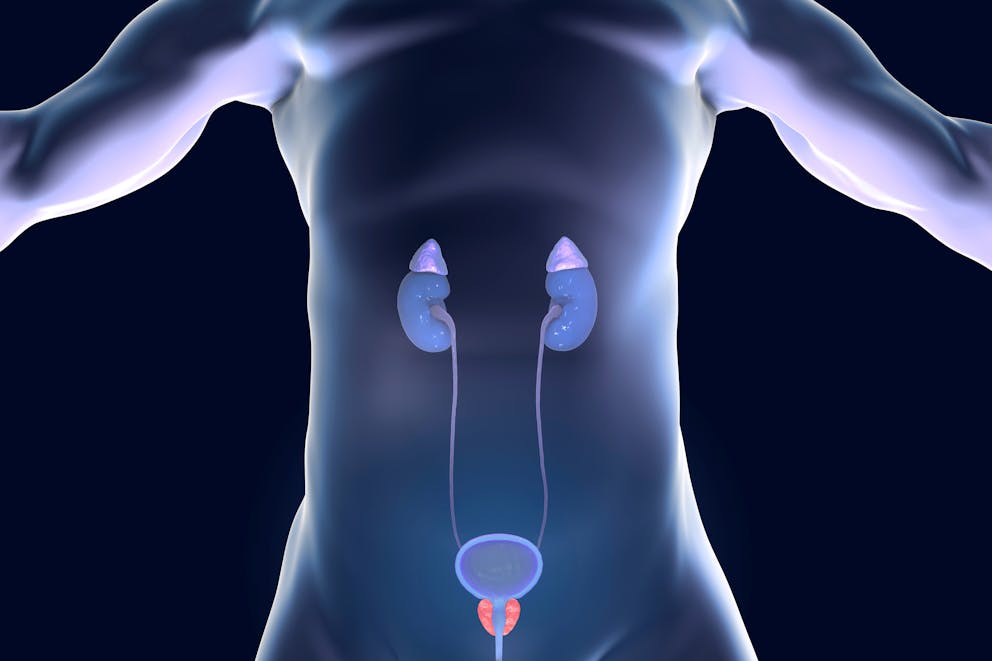
What is the prostate?
The prostate is a small walnut-shaped gland that sits just below the bladder in front of the rectum and wraps around the urethra—the tube that carries urine from the bladder and semen from the testicles.
Its primary function is to produce prostatic fluid that carries semen during ejaculation and contains nourishing compounds that keep sperm cells fertile.
The prostate also helps to regulate the flow of urine and plays an essential role in the production of male sex hormones, including testosterone.
Watch the video below to learn how zinc can help shrink an enlarged prostate naturally.
What causes an enlarged prostate?
The size of the prostate gland can vary depending on factors such as age and body size. However, most normal prostate tissue is about the size of a walnut or a ping-pong ball.
As men age, it’s common that the prostate gland increases in size, a condition known as benign prostatic hyperplasia (BPH). It’s believed that age-related hormonal changes trigger the proliferation of prostate cells and the development of nodules, which causes prostate enlargement.
In fact, a study published in The Lancet found that more than half of all men aged 60 and as much as 80 percent of men aged 90 and older have an enlarged prostate gland.
Individuals with a family history of BPH, obesity, heart disease, insulin resistance, and diabetes appear to be at an increased risk, which may indicate that prostate health is influenced by a number of metabolic factors.
Here are common symptoms of an enlarged prostate:
Difficulty starting urine flow
Interrupted urine flow
Feeling that the bladder isn’t empty after urination
Incontinence
Zinc deficiency has recently become a main focus of research investigating the underlying causes of prostate enlargement.
A study published in Frontiers of Oncology found that “Insufficient zinc levels might have troublesome repercussions for men. Indeed, in prostate cancer tissue, mean zinc levels are decreased by up to 80%, and in prostatic tissue derived from BPH, zinc levels are decreased by more than 50%.”
It’s important to note that prostate enlargement does not increase the risk of prostate cancer. However, it’s possible to have both conditions simultaneously, and it's crucial to consult with a healthcare provider if you experience any issues with urination or other symptoms of prostate enlargement.
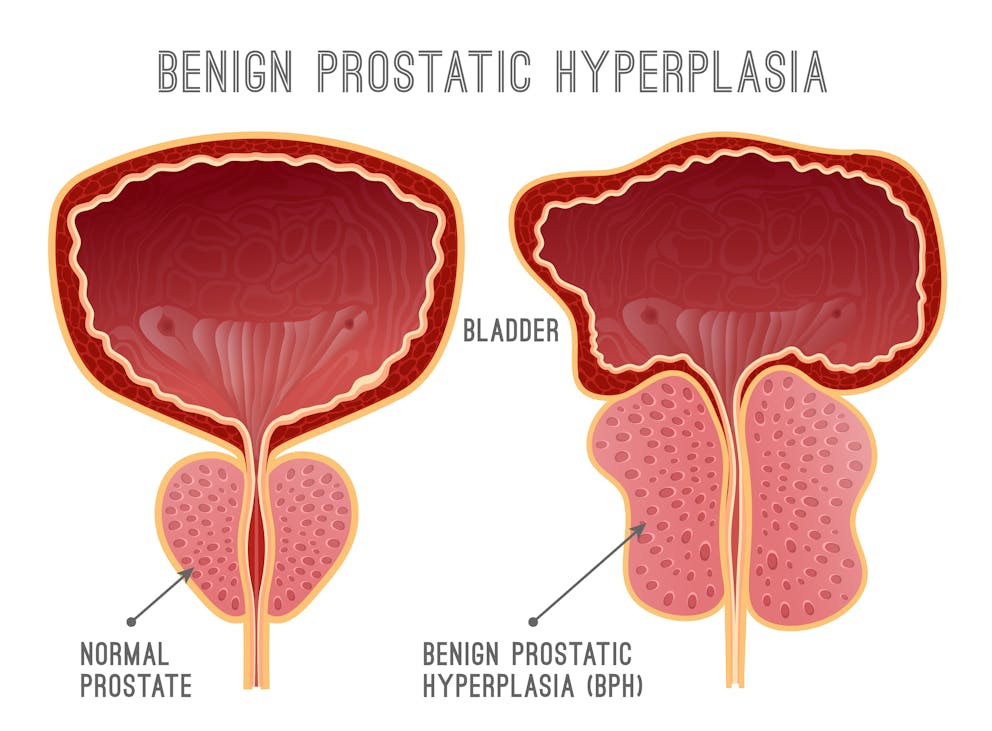
Why does zinc help shrink an enlarged prostate?
While zinc can be found in almost every cell in the human body, the prostate glands contain the highest concentrations of this essential mineral.
Zinc plays a crucial role in maintaining prostate health and regulates several functions of the prostate gland, including the production of prostatic fluid and testosterone.
Zinc controls the growth of prostate tissue, and zinc deficiency can trigger unregulated cell proliferation and prostate enlargement.
In addition, zinc may help to stop and even reverse prostate growth through its ability to control key hormones within the prostate.
Prostate cells are highly sensitive to hormones, particularly testosterone and dihydrotestosterone (DHT). DHT is known to stimulate the growth of prostate cells, and elevated DHT levels are found in the majority of prostate tissue samples in men with an enlarged prostate.
Zinc inhibits the activity of the enzyme that converts testosterone into DHT, thereby reducing the amount of DHT available to trigger the growth of prostate tissue.
Correcting a zinc deficiency helps to restore normal cell growth and hormone levels, which explains why taking zinc can be effective at shrinking an enlarged prostate.
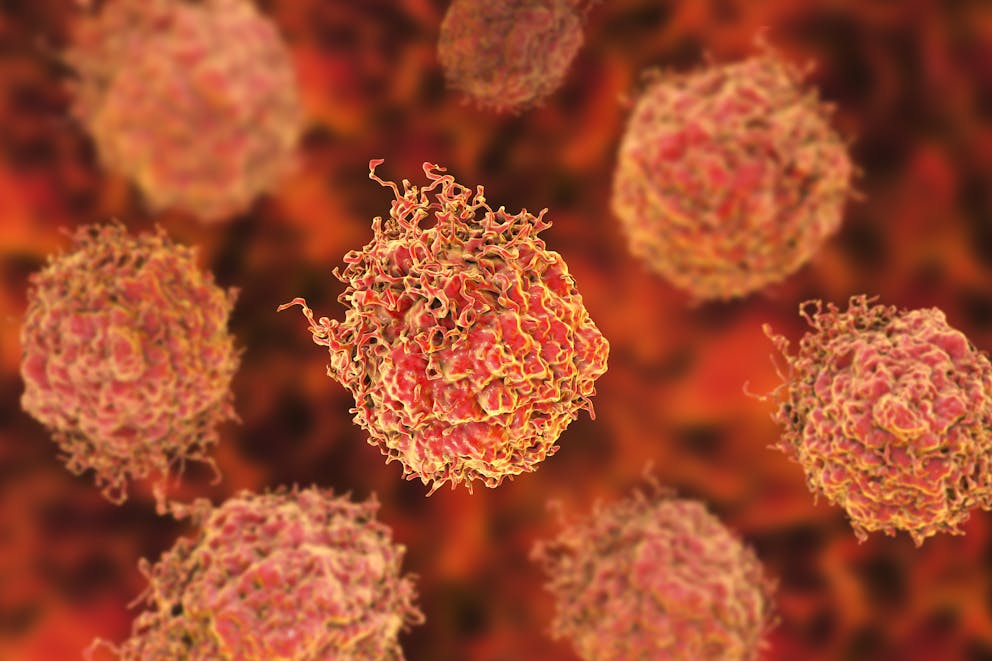
Zinc and prostate cancer
Although prostate cancer incidence is declining, it remains the second most common type of cancer in men.
Zinc has been extensively studied in relation to prostate cancer development, and there is ample evidence that a zinc deficiency can significantly contribute to the development of carcinogenic prostate cells.
Zinc is a powerful antioxidant that can protect prostate cells from free radicals. These harmful metabolic by-products damage cellular structures and DNA, which can lead to mutations and the formation of cancerous prostate tissue.
It’s also believed that zinc’s anti-inflammatory properties protect prostate health and lower the risk of prostate cancer. Chronic inflammation is a main contributor to irregular cell growth and the development of cancer cells.
Zinc reduces intracellular inflammation, which can help to prevent the growth and proliferation of prostate cancer cells.
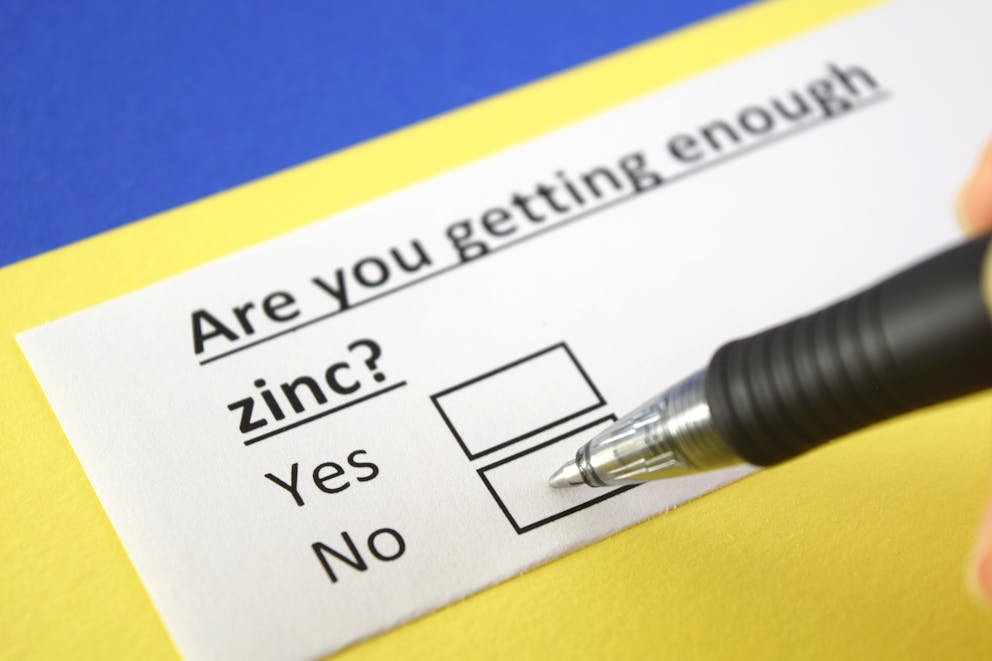
Signs of zinc deficiency
Zinc deficiency is common. According to a report by Emily Ho, Ph.D. and Director of the Linus Pauling Institute, “In the United States, about 12 percent of the population is at risk for zinc deficiency, and perhaps as many as 40 percent of the elderly, due to inadequate dietary intake and less absorption of this essential nutrient.”
Here are common signs and symptoms of zinc deficiency:
Low libido
Poor wound healing
Frequent infections
Loss of appetite or taste
Diarrhea
Brittle nails
Skin rashes or acne
Delayed growth or sexual development in children
Although zinc is found in a range of foods such as red meat, seafood, seeds, nuts, and dairy, there are some surprising reasons for zinc deficiency despite consuming plenty of zinc-rich foods.
Factors such as low stomach acid and medications, including antacids and diuretics, and phytates in grains significantly reduce or even block the intestinal absorption of dietary zinc.
In addition, alcohol, insulin resistance, a high-carb diet, and cholesterol-lowering drugs have been found to deplete the body’s zinc stores by increasing urinary zinc excretion, which may explain why so many individuals are at risk of zinc deficiency.
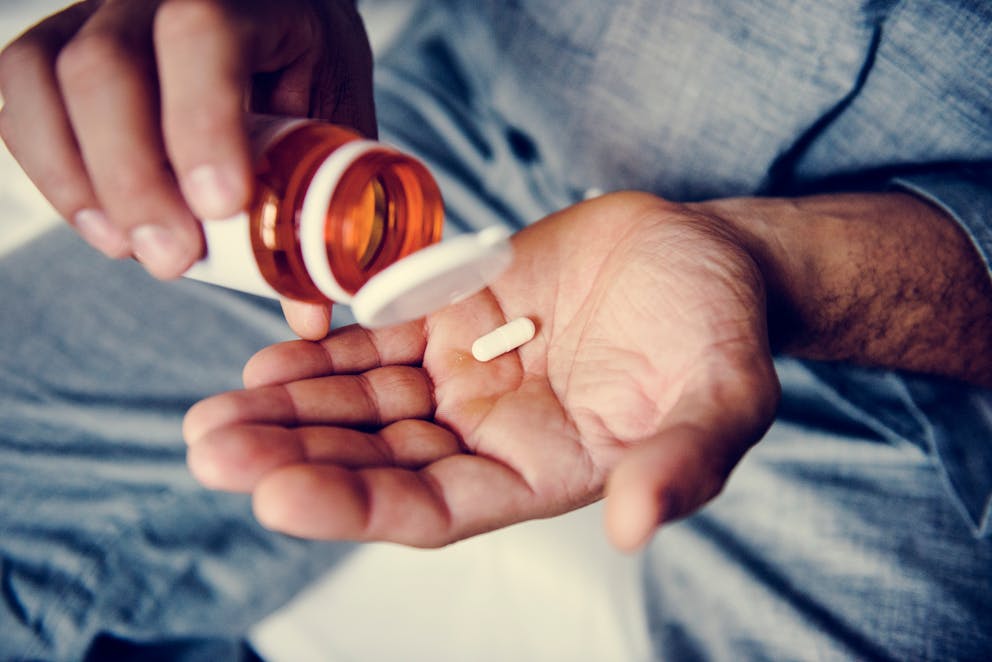
How much zinc for an enlarged prostate
The recommended daily zinc intake for adult males is 11 mg. However, to shrink an enlarged prostate, significantly larger doses of up to 25 mg daily may be needed to replenish zinc concentrations in prostate tissue.
Six medium-sized oysters—the highest zinc food in the world—contain around 30 mg of zinc. However, consuming oysters daily is likely impractical, and taking supplemental zinc is an excellent alternative.
To support a healthy prostate gland, it’s recommended to take zinc citrate or zinc picolinate, which are highly bioavailable forms that are easily absorbed and incorporated into prostate cells.
Can too much zinc cause prostate issues?
There is evidence that taking too much zinc can worsen an enlarged prostate and may increase prostate cancer risk.
A study published in Biomedicine found that taking zinc supplementation in doses of 100 mg daily and above significantly increased the risk of aggressive prostate cancer cells.
The study also discusses that taking zinc supplements for ten years or more is linked to prostate diseases, including BPH and advanced prostate cancer progression.
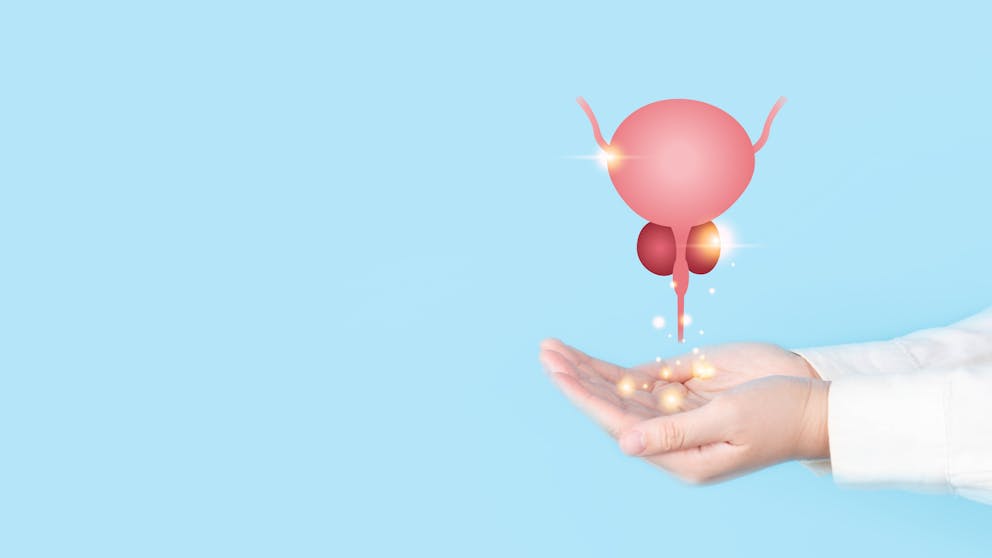 Key takeaways
Key takeaways
Zinc plays a crucial role in maintaining prostate health, and inadequate zinc levels are linked to an increased risk of prostate enlargement and cancer.
Correcting a zinc deficiency can restore normal prostate cell growth and may help to shrink an enlarged prostate gland.
While zinc has several benefits for male health, it’s important to understand that taking large doses of zinc for prolonged periods can increase the risk of prostate diseases, including prostate nodules, prostate enlargement, and prostate cancer.
FAQ
1. Does zinc shrink prostate tissue?
Yes, zinc can be effective at shrinking an enlarged prostate gland.
Zinc regulates the growth of prostate tissue and supports balanced hormone levels, which controls the proliferation of prostate cells and may help to prevent or reverse an enlarged prostate.
2. How much zinc should I take for my prostate?
The recommended dietary allowance (RDA) for zinc is 11 mg daily for adult men. However, correcting a zinc deficiency and reversing an enlarged prostate may take up to 25 mg of zinc per day.
3. Which form of zinc is best for the prostate?
Zinc citrate and zinc picolinate have been studied for their potential benefits for prostate health. These forms of zinc are more readily absorbed by the body than other forms, making them more effective at increasing zinc levels in prostate tissue.
4. What supplements can shrink an enlarged prostate?
Zinc supplementation can be beneficial in reversing an enlarged prostate gland. Low zinc is also a risk factor for tumor growth and prostate cancer.
In addition, there is evidence that saw palmetto and pygeum, an extract derived from the bark of the African plum tree, may be effective at reducing the size of the prostate and improving urinary issues.
5. Can too much zinc affect your prostate?
Yes, too much zinc can cause prostate enlargement and may increase your risk of developing prostate cancer.
Regularly taking 100 mg of zinc or using zinc supplements for ten years or more has been linked to benign prostatic hyperplasia, also known as enlarged prostate, and may contribute to the proliferation of cancerous prostate cells.
6. Is zinc good for the prostate?
Zinc is an essential mineral that regulates many prostate gland functions, including the production of testosterone and prostatic fluid.
It also governs the growth and proliferation of healthy prostate cells, and a lack of adequate zinc can lead to hormonal imbalances and prostate enlargements and may increase the risk of prostate cancer.
7. Can zinc cure prostatitis?
Although zinc isn’t considered a cure for prostatitis, zinc helps to reduce inflammation in prostate tissue and supports immune functions, which has been found to improve symptoms of prostatitis.
8. How much zinc is too much for prostate health?
Taking zinc supplements for more than ten years or regularly taking dosages of 100 mg per day can negatively impact prostate health and increases the risk of prostate enlargement and cancer.
Previous blog
How to Kill Viruses
Popular
08/21/2024
55K views
02/23/2025
46.3K views
11/18/2024
277.5K views
03/18/2024
11/21/2022




